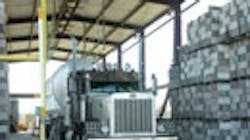Truck wash offers quiet country ambiance with professional tank cleaning service
Tony and Renee Miller of Salt City Truck Wash in the Piney Woods of East Texas have the benefit of a tank cleaning business combined with a rural lifestyle that many urbanites would envy. However, it wasn't always like that.
It was only in the late 1990s that they were able to leave their city jobs in the Dallas Metroplex and move to 30 acres of property they inherited near Grand Saline — a move that eventually would lead to them opening a tank trailer washout business.
Today, their home and the wash bay sit atop a hill overlooking rolling meadows thriving from the irrigation provided by wastewater captured at the cleaning facility.
All of this began when the couple originally moved to the farm, bought a milling machine, and operated a machine shop with eight employees. Tony had worked in the city as a machinist for 11 years.
“Everything was going well, but when NAFTA went into effect, we lost our customers to Mexico,” says Tony. “We were down to one employee.”
To fill the gap, he bought a one-ton truck and began a hot-shot service. “We also needed a truck for the machine shop, but the hot-shot service helped subsidize that business.”
Wandering driver
But it wasn't long before a truck driver wandered onto the farm property looking for a wash service for his hopper trailer. “We were at home in 1999 visiting with a friend when this driver turned into our drive,” Tony recalls. “I asked what he was talking about when he asked for a washout and he explained. After I finished the job, he asked how much he owed me. We settled on a price and then we went out for a pizza. A few days later another driver arrived with a pneumatic trailer. Since then, it's been pretty much word of mouth.”
Today, the tank wash serves tank trailers, dry bulkers, vans, and hoppers and typically handles about 10-20 per week. The majority of the business is generated by a nearby salt processor that ships product to and from food processors and feed mills.
“In addition to the trailers hauling salt, we see a lot of fracturing sand used in the oil fields, roofing granules, and plastic pellets,” Tony says. “But we don't handle any trailers hauling hazardous materials.”
Miller began washing out trailers with well water on the property in an open area, using a garden sprayer and hose. It wasn't too long before things picked up. With his mechanical training, he decided to design and build his own tools that eventually led to a spinner that can deliver 60 gallons per minute. A 3,000 psi Landa washer is powered and heated by diesel and is used with Miller's equipment in the tank cleaning process.
Volume versus pressure
“We have found that volume is better than a high pressure for our business,” Tony says.
The salt processor requires washouts lasting five minutes at 120° F, and the equipment works well for that standard. In addition, some customers request a cold water cool-down service to prepare the tank for certain temperature-sensitive products.
He also built a sprayer in an auger-like snake design to clean product and aerator lines. For safety, he constructed a 130-foot-by-20-foot stainless steel guard rail that is lowered atop the tank trailers for personnel fall protection.
“Finally in 2000, we washed two trailers in a day,” Tony recalls. “I decided to draw plans for a bay and said if we have three customers in one day, we're calling the concrete people.” Soon the call was made. Miller constructed a covered bay on a concrete slab and is gradually adding concrete block walls so that the bay eventually will be enclosed.
Wastewater is captured in the bay and pumped into six, 750-gallon underground storage tanks where solids typically are removed and hauled away. One customer required a cleanout after transporting molasses. The wastewater was used as fertilizer for the hay fields, Tony says.
Residual wastewater is used to irrigate the surrounding meadow, which produces a significant number of hay bales each year. It's not unusual to produce 118 rolled bales in one cutting with three cuttings a year.
In addition to the advantages for hay production, the tank wash location appeals to truck drivers, who enjoy its restful ambience, says Renee. “They often comment on how much they appreciate the quiet,” she adds. “They seem to love to park here, put their windows down, and enjoy the fresh air.”
Office management
Renee handles the office management for the tank wash, applying her expertise from working in a bank. In 1998, she resigned from the bank to take on the company's accounting, scheduling, and other duties full time. She uses QuickBooks accounting software to track bills, invoices, and payroll.
About 40 regular customers in the database are billed directly while drive-up customers pay by the service. “We provide three copies of the invoice to the driver, one for the shipper and two for the trucking company,” Renee notes.
Two people typically handle the washouts. Tony's brother, Todd, does most of the work with an assistant and completes the jobs usually in about 20 minutes. The tank wash is open 7 am to 4 pm Monday through Friday but is available weekends and nights by appointment.
It's not unusual for the Millers to awaken in the morning to find a truck and tank trailer parked on the property with a driver happily awaiting service — relishing the scenery and fresh air. Although the couple's decision to leave the city for the country wasn't originally calculated to develop a tank wash, their move has paid off for them and their customers.
